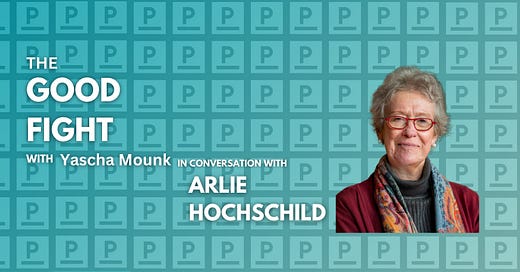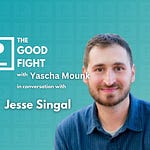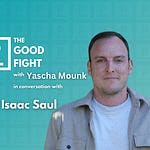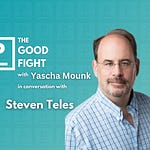Thanks for reading! The best way to make sure that you don’t miss any of these conversations is to subscribe to The Good Fight on your favorite podcast app.
If you are already a paying subscriber to this Substack or Persuasion, this will give you ad-free access to the full conversation with Arlie, plus the exciting bonus episodes we have in the works! If you aren’t, you can set up the free, limited version of the feed—or, better still, support the podcast by becoming a subscriber today!
And if you are having a problem setting up the full podcast feed on a third-party app, please email our podcast team at leonora.barclay@persuasion.community.
Arlie Hochschild is an author and professor emerita of sociology at the University of California, Berkeley. Her books include Stolen Pride: Loss, Shame, and the Rise of the Right and Strangers in Their Own Land: Anger and Mourning on the American Right.
In this week’s conversation, Yascha Mounk and Arlie Hochschild discuss the fear of empathy among the American left, the impact of the loss of pride among white working class communities, and how to understand the deep story of Latinos who voted for Trump in 2024.
This transcript has been condensed and lightly edited for clarity.
Yascha Mounk: You’re a sociologist who tries to understand Americans by going to particular places to study them with a lot of time and depth. What do you think that method reveals? What do you think we academics and social scientists—and Americans more broadly—can learn by engaging with some of the places that tend to be out of our way?
Arlie Hochschild: It's such a privilege to actually go to a small place. The first time I did it in the Deep South in Lake Charles, Louisiana. The second time in Appalachia, in Pikeville, Kentucky. When you really get to sit down with people, you're seeing what they feel and the history as to why they feel the way they do, and the circumstances that might predispose them to be open to Donald Trump.
Mounk: I feel one of the things that it does is to create empathy for people whom one might otherwise see as the adversary or the enemy. I'm always struck by the fact that, for my friends and acquaintances in left-leaning liberal America, when we look at cultures very far away with moral values that are probably very different to those of most people living in the same country, they have a lot of empathy for people living in very traditional societies in Asia or Africa or South America. When it comes to the proximate “other,” people living in their own society who disagree with them about economic policy or about trans rights or about the virtues of the new President of the United States, that empathy can quickly disappear. You have an interesting vantage point here because as you say repeatedly and explicitly in both of your last books, you're a liberal college professor from Berkeley, California, and you have profound disagreements with many of the people who you study. I'm sure you didn't like every person you talked to in Louisiana and every person you talked to in Kentucky. But there is a genuine sense one gets that you come away with a positive view of these communities and the people within them.
Hochschild: I think people feel afraid of empathy. Empathy is a dangerous thing, actually. Not only is it not of interest, but people are scared of it. If you empathize with the “enemy,” you're complicit. That tells you how fragile actually people feel in their membership. I often get told, I don't know why you do it, and I don't know how you do it. That strikes me as one thing that I hope that my books do. First, to be a mirror on liberal subcultures. And the second is to invite people to not be alarmed at making room in their hearts for people who are very different. Making room doesn't mean you're any less who you are. I don't feel my politics change at all. I write my books to help people become bilingual.
Mounk: I imagine that if you’re a sociologist or an anthropologist who goes to study very traditional or patriarchal societies somewhere abroad that the reaction of colleagues over dinner wouldn’t be, how do you do it? Presumably the gulf in lifestyle habits and values is much bigger, but people would say, how exciting that must be. But the response to visiting a different community within the United States is, my god, that must be so exhausting being around these people. I mean it is I think very revelatory in that respect. The last book included many years of spending time in Kentucky. That particular part of Kentucky is one of the most strongly Republican and pro-Trump parts of the United States.
Hochschild: It didn't used to be, but it is now. The district I visited, KY5, is the whitest and second poorest congressional district in the country. There I found a kind of small version of a national story that has to do with white non-college Americans. They've taken a hit over the last two decades, with lost income and lost property, and they have all the social signs of downward mobility. What we saw in microcosm in Pikeville, Kentucky was a smaller version of a larger story. These are people who are proud of being resilient and highly individualistic. So I came to focus on what I call the pride paradox. We have people in this community who used to have wonderful coal mining jobs and they were like GI war heroes because it was dangerous work and they felt heroic doing it. They came back with black lung, sacrificing their health for their family and community. All of this was a source of great pride. Then whoops, the mines close, you're on your own, there are no other good jobs. As one man told me, you can either stay and get a “girly job”—by which I mean a low-paid service job for teenagers with a wage that won't support a family—or you go on Route 23 north to Cincinnati, but those factories close too, and then you come back empty-handed. So you have proud people, but with a story of loss. I argue in this book that if we focus on emotions, then we’re looking at loss, and at people who've given up on both parties, so they turn to a magic man, to a charismatic person. How does charisma work? One man told me, Donald Trump, he's like lightning in a jar. It’s an emotional narrative and pride turns out to matter a lot.
Mounk: One of the things that drove me apoplectic during the first Trump presidency was that there are many things to rightly criticize about him and yet, again and again, I saw friends and colleagues, or people on CNN and MSNBC, beating up on things in a way that was exaggerated, taken out of context, or unfair. And I thought, why? This makes it so easy for them to say, they can't take a joke, they distort everything I say.
In pointing out the pride paradox, you draw on one of the standard questions in social science research, which is: do you think that by and large when people succeed, it's because of their own individual agency, or because of the kind of circumstances in which they're in? And you point out that there is a difference between more left-leaning respondents and more right-leaning respondents. The former tend to say that it is because of circumstances and luck, and the latter tend to say it's because of individual choice. I buy that there is this distinction but I wonder whether the reality of it is a little bit more complicated.
Hochschild: People in the heartland of red America look at circumstances and structures. One guy, for example, a very thoughtful recovering heroin addict was homeless when I first met him. I asked him about pride and shame and he said, well, a guy gets laid off at the mines and first he shakes his fist at the supervisor, then he shakes his fist at the owner of the coal company and then he shakes his fist at the Democratic Party and Obama who called for clean energy. So yes, you have a guy in an individualist culture that's blaming the structure, but it doesn't last. He thinks after a while that it’s on him. That's when the shame kicks in.
Mounk: I guess there's two interpretations of why they have elevated levels of shame. One of them is just that they experience the kind of events that often induce shame at a much higher rate. It just happens to be the case that if you grow up in Pikeville, Kentucky, born in 1980, when the core jobs are still there and then they up and leave, you're much more likely to end up experiencing shame and blaming yourself because your life circumstances are more likely to induce the causes of that, relative to if you are born in an affluent suburb of New York City with the opportunities, educationally and economically, that go with that. The second interpretation is that there's a cultural element. Obviously there's going to be more people experiencing those kinds of shocks in Pikesville, Kentucky than in Greenwich, Connecticut. But if you are from Greenwich, Connecticut, and it so happens that despite the favorable circumstances, you're really unlucky, and you also experience all of these shocks, you will end up as likely to experience that kind of shame and then possibly the same kind of circumstances. Is this a kind of a compositional effect or is there a cultural element beyond the compositional effect that leads people in those two places to respond to similar shocks when they are present in different ways?
Hochschild: My vote is that there's something beyond the circumstance effect. I think it's culture.
Would you (or someone you know) like to read my articles in German or French? Please subscribe to my sister Substacks!
Mounk: We've been talking a lot about the individual level of pride, the pride you have in your own life achievements, in your own status within a particular social context. You write about the ways in which places like Pikesville have also lost the grounds for a lot of that collective pride. It used to be the case that they could deliver a lot of the nation's coal, that they were contributing to the growing economy. But the longstanding injury of being mocked as hillbillies, of being one of the poorer parts of America, of being looked down upon and joked about, now bites more because those grounds for collective pride are more vulnerable. So how has that change happened?
Hochschild: Yes, collective pride is hugely important. I'm glad you raised that. They've taken a hit in their collective pride. We kept the lights on. We won World War I and II. We're the provider to the nation. That's another hit, another loss. So let's look at national pride, and Trump fits in there too. Hey, America, we can put other people down or other nations down, because people were kind of starved, in their collective pride.
Mounk: When I teach about populism, I have a whole section of the course that I've taught in different kinds of iterations about the roots and the origins of populism. And I assign many works of political science and sociology and economics. One of the texts that my students find to be most convincing, and that I too have been very influenced by, is your account of what you call the deep story.
Hochschild: Yes, a deep story is not a matter of what you say you believe or your party affiliation. It's a matter of how you feel. This deep story that emerged when I was in Louisiana listening to people’s accounts of their lives was that you're a middle-aged man, you feel like you're waiting in line. At the very end of line is the American Dream. It's at the top of the hill. You can barely see it. And the line hasn't been moving. You're not prejudiced against anybody as you see it, you’re waiting patiently. And then there are line cutters. Well, you’re a white male, remember. It's a woman that gets there, damn, half the population are them, so new competitors. Blacks getting in, immigrants, refugees, highly-paid public sector workers are all line cutters. And then you look over your shoulder and Barack Obama is waving to the line cutters.
Then there's an existential crisis. Am I getting out of this line? What's happening? The final moment in the right-wing deep story is that someone ahead of you, maybe with more education, turns around and calls you a prejudiced, racist, sexist, homophobic redneck and then you think, okay, I am furious. I've been shamed in two ways here—pushed back and then shamed for being at the back. Then this charismatic leader comes who seems to take you out of that situation. That is the right-wing deep story.
Then one woman told me, no, you have it a little bit wrong. Actually, the people waiting in line have paid the taxes that are benefiting the people who are cutting in line. And another woman said, we're just succeeding. So those were the stories that I heard people responding to in the second book, Stolen Pride. A guy who had read the first book said, Well, that’s not quite right. It's not up to date. We're waiting in line and there's a bully in line that is keeping us back and helping the line cutters. That's the bad bully. For them that was Barack Obama, calling for clean energy in this coal region. But then there's a good bully in line. You may know that he's not really a nice person, that he doesn't obey the rules. You don't admire his personal life, but he's our bully. That is the update to the deep story and the danger for democracy.
Mounk: That is a helpful update because it makes sense of how smart, thoughtful and decent people can support Donald Trump. Maybe some people were just bamboozled by him and generally think that he's the most amazing person who's never done anything wrong—I think those people exist a little bit more in the liberal imagination than in conservative reality—but it provides a story for why you might support that person.
Hochschild: He seems like the Robin Hood of stolen pride. He’s a good bully in that way. And I do believe that stolen pride is the major right-wing prevailing narrative—the election was stolen, our jobs were stolen. If you feel, hey, that Robin Hood’s getting my pride back, let him go ahead and steal from others to get it.
Mounk: One of the key stories of the 2024 election is the huge swing towards Donald Trump in many minority communities, including African Americans, Native Americans, and Asian Americans, but particularly among Latinos. And it seems to me that the deep story you tell doesn't quite seem to apply to that part of the electorate. First, a lot of the people who are voting for Trump are the people who, in that metaphor, are the ones supposedly cutting into line. And secondly, that is a part of the American electorate for whom the line often has been moving. Not because they're so much more advantaged than white Americans, but because they might have immigrated or have parents who have immigrated from very poor societies. They might have started life in America at the very bottom rung of society because perhaps they didn't speak English yet. And now many of them are starting to have associate's degrees, bachelor's degrees, perhaps master's and professional degrees, and they're actually doing a lot better than their parents or grandparents were. So the idea that they feel sort of stuck at the back of the line doesn't seem to apply to some of them. How should we think about the very different demographic pattern and support for Trump in 2024 relative to what it was in 2016?
Hochschild: I think there were three kinds of voters in the area that I was focusing on. One was the true-believing MAGA people who felt this is the Robin Hood for my stolen pride. The second group were pragmatists who said, it's useful to me to vote for a guy like that. I'm quite critical of him, but hey, maybe he could help my group. And the third category were democratic dropouts. People who had altogether despaired of the political process. My theorizing was about the first group. But I think there are a lot of pragmatists, and I would suspect a lot of the Latino Trump voters would say, there’s something in here for me. Let me get on that train.
Mounk: Each part of this puzzle is important to explain. But it feels to me that for many purposes, that means that we really need an explanation for the other groups. I always had this impression during the first Trump presidency that we fought far too much about how to persuade the MAGA true believers to change their mind. Because it always seemed to me that's not what makes him win.
What makes him win is that a lot of people who are not true believers are willing to vote for him or willing to go along with him.
In the rest of this conversation, Yascha and Arlie discuss the liberal deep story and the flaws in the Democrats’ strategy. This discussion is reserved for paying members…
Listen to this episode with a 7-day free trial
Subscribe to Yascha Mounk to listen to this post and get 7 days of free access to the full post archives.














